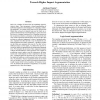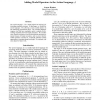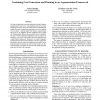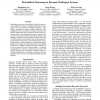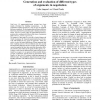NMR
2004
Springer
15 years 7 months ago
2004
Springer
Unlike most non-monotonic logics Plausible Logic was designed from the very beginning with computer implementation in mind. But one aspect of implementation was neglected, namely ...
97
Voted
NMR
2004
Springer
15 years 7 months ago
2004
Springer
We propose in this paper a new family of belief merging operators, that is based on a game between sources : Until a coherent set of sources is reached, at each round a contest is...
113
click to vote
NMR
2004
Springer
15 years 7 months ago
2004
Springer
In the context of Dung’s argumentation framework, we propose a general recursive schema for argumentation semantics, based on decomposition along the strongly connected componen...
104
click to vote
NMR
2004
Springer
15 years 7 months ago
2004
Springer
Within the law, the traditional test for attributing causal responsibility is the counterfactual “but-for” test, which asks whether the injury complained of would have occurre...
97
Voted
NMR
2004
Springer
15 years 7 months ago
2004
Springer
121
click to vote
NMR
2004
Springer
15 years 7 months ago
2004
Springer
There are a number of frameworks for modelling argumentation in logic. They incorporate a formal representation of individual arguments and techniques for comparing conflicting a...
127
click to vote
NMR
2004
Springer
15 years 7 months ago
2004
Springer
The action language A is a simple high-level language for describing transition systems. In this paper, we extend the action language A by allowing a unary modal operator in the u...
128
click to vote
NMR
2004
Springer
15 years 7 months ago
2004
Springer
conflicts between goals and plans in Dung’s abstract argumentation framework. Argumentation theory has traditionally been used to deal with conflicts between defaults and beli...
137
click to vote
NMR
2004
Springer
15 years 7 months ago
2004
Springer
Probabilistic reasoning with multiply sectioned Bayesian networks (MSBNs) has been successfully applied in static domains under the cooperative multiagent paradigm. Probabilistic ...
176
click to vote
NMR
2004
Springer
15 years 7 months ago
2004
Springer
Until now, AI argumentation-based systems have been mainly developed for handling inconsistency. In that explanation-oriented perspective, only one type of argument has been consi...

